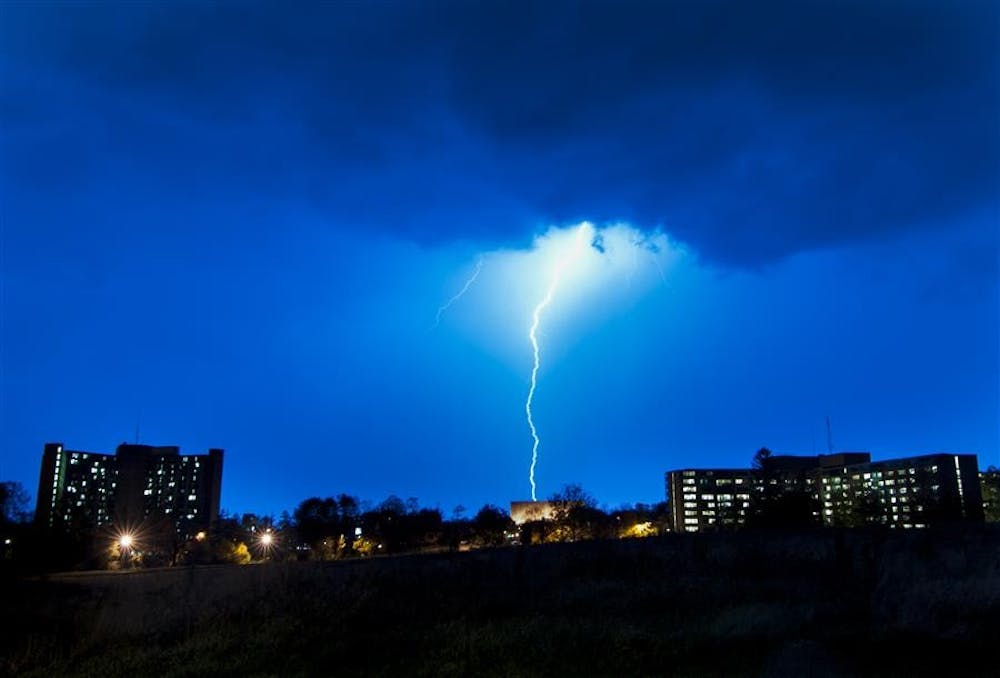With an annual average of 21 tornados, the Hoosier State is especially susceptible to a fair share of severe weather.
Gov. Mike Pence declared March 24-30 Severe Weather Preparedness Week in Indiana.
“The week is so that people have more awareness of the potential of severe weather and how people can prepare,” said Kriste Lindberg, education specialist for Bloomington Parks and Recreation. “And who knows? We might be able to save a few lives.”
Each day throughout the week, Monroe County Emergency Management will highlight a different topic pertaining to severe weather preparedness. Information will be shared in the form of press releases and community activities.
The City of Bloomington will offer the program Severe Weather Watchers from 6:30 to 8 p.m. Tuesday at City Hall’s McCloskey Room, 401 N. Morton St. The Indiana Department of Homeland Security and Monroe County Emergency Management will sponsor a drawing for 10 weather radios at the event. Registration will extend through Monday and possibly Tuesday, Lindberg said.
Monroe County Emergency Management Director James Comerford and Administrative Assistant Jessica Renn will speak at the event
“We’re working with Monroe County Emergency Management folks to inform the public of severe weather,” Lindberg said. “And to learn a little bit about how it works in the county and some ways to get involved if they like.”
Comerford said the primary types of severe weather affecting Indiana are thunderstorms, tornados and floods.
“When springtime comes, you’re going to see tornado watches and warnings that come along too,” he said. “They can happen year round, but springtime is the peak season. We want people to be aware what warnings and watches mean.”
Tornado sirens will sound twice statewide on Wednesday. The National Weather Service, in conjunction with the Indiana State Police and Public Safety Commission,
Indiana Department of Homeland Security, Department of Education, the Indiana Broadcaster’s Association, the Red Cross and Amateur Radio Operators will conduct the statewide test of communication systems.
Sirens will sound in Monroe County at about 10:15 a.m. and 7:35 p.m. Each siren will last five minutes, the standard time for an actual tornado warning.
Comerford said it is important for residents to understand the difference between a tornado watch and a warning.
“A watch means conditions are favorable for a tornado,” he said. “A warning means one has been physically sighted or detected by radar. When people hear those sirens what they really need to do is find out what the warning means. The warning isn’t over just because the siren stopped going.”
In addition, he emphasized being aware of flood warnings. There are two types of flooding, he explained: river flooding and flash flooding.
“In Monroe County, most of ours is flash flooding,” he said. “When you’re getting heavy rain, most people know if they live in an area susceptible to flooding. Most of the
people just keep a vigilant eye out,” he said.
But, he said, heeding the County watches and warnings can save lives.
“We highly recommend purchasing a weather radio,” he said. “It gives watches and warnings, and explains what those mean.”
Lindberg said more public knowledge will result in a safer community.
“The more prepared we are, the better we are,” Lindberg said.
Register online at bloomington.in.gov/parks
Severe Weather Preparedness Week topics
Monroe County Emergency Management will highlight a different topic each day related to severe weather preparedness. The topics will examine the roles of individuals, National Weather Service, Indiana Department of Homeland Security, state and local public officials, the American Red Cross and media in preparing for severe weather.
Monday
Severe Weather Outlook: Partners’ roles at the Outlook stage of an event
Tuesday
Watch: Partners’ roles in the Watch stage of an event
Wednesday
Everyone’s roles in Warnings: Taking action when Warnings are issued
Thursday
Response: Partners’ roles in responding to disasters (real-time response)
Friday
Recovery: Partners’ roles in the recovery process (days/weeks/months after disaster)
Saturday
Wrap-Up: Importance of preparedness and action during threatening hazards
County programs to teach severe weather preparedness

Get stories like this in your inbox
Subscribe





